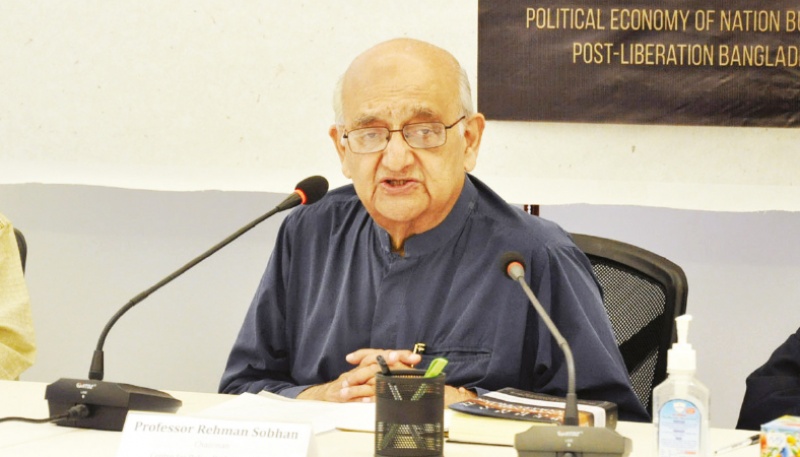Staff Correspondent
Published:2022-04-10 18:14:34 BdST
50 YEARS OF BANGLADESHEasy to make policies, implementation still difficult: Prof Rehman Sobhan
It is easy to make policies after 50 years of Bangladesh’s journey but their implementation is still difficult, Centre for Policy Dialogue (CPD) Chairman Professor Rehman Sobhan has said.
He said there are a lot of discussions about policymaking in the country but not much about their implementations.
Those discussions should be brought to the fore, said the noted economist at the unveiling of his new book titled “Untranquil Recollections: Political Economy of Nation Building in post-Liberation Bangladesh”. The programme was held at the CPD office in the capital on Saturday.
Published by the University Press Limited, this is the second volume of his memoir where he has presented the situation of Bangladesh’s political economy from 1972 to 1975. The name of the volume is Dawn to Darkness.
Professor Rehman, one of the four founding members of the Planning Commission, said, “One experience I learned from policymaking that still stays with me is that it is the easiest part of running a government. Policy implementation is the actual challenge.”
He said he had the good fortune of serving only the Bangabandhu’s government and no such opportunity had come since then. “I think that time was important for me. The history and the reality of that time have come up in the book.”
The CPD chairman recalled some of his experiences of obstacles that he and the Planning Commission had faced back then, how Bangabandhu guided them and provided them with political support, and how some officials in the bureaucracy would often create roadblocks.
He said the new generation needs to understand what Bangladesh was like back then as well as the philosophies and values of that period. He also said he tried to capture the reality as objectively as possible in the book.
Several guests attending the programme discussed the book. They said it tells the story of rebuilding a newly independent country devastated by war, with its political leaders and other government officials not having enough experience of ruling a country.
Professor Rounaq Jahan, wife of Professor Rehman and a Distinguished Fellow at the CPD, said the book is important to know the history of that time. “He [Professor Rehman] highlighted the challenges existing at the beginning of Bangladesh’s journey. Many of these challenges still exist.”
Dr Kamal Hossain, the country’s first law minister and foreign minister, said the book describes the frustration between Professor Rehman and the three other Planning Commission members caused by the conflict with the bureaucracy.
“Given the opportunity to be very close with Bangabandhu, he [Professor Rehman] saw Bangladesh’s economic development on the one hand and was aware of the political issues on the other.”
Professor Mustafizur Rahman, a distinguished fellow at the CPD, said the book is important to understand the new economic management and the globalisation process that the country is part of now.
He said Bangabandhu loved socialism. “The book explains why there was a gap between the Planning Commission members and political leaders behind the non-implementation of socialism.”
The Planning Commission is the economic public policy institution of the Bangladesh government. It was formed in 1972 by four professors – Rehman Sobhan, Nurul Islam, Anisur Rahman, and Mosharrof Hossain. They resigned one by one within a few years.
In this context, The Daily Star Editor Mahfuz Anam said, “Why did they leave the commission? What was their frustration? What was the gap between the concept of socialism of political leaders and the commission members? We should know the answer.”
Habibul Haque Khondker, social sciences professor at Zayed University in the United Arab Emirates, attended the programme online and said the importance of the Planning Commission was much higher after Bangladesh’s independence. He said the people associated with the commission were not only technocrats but were also involved in the history of independence.
M Syeduzzaman, former finance minister and planning secretary and a member of the CPD Board of Trustees, chaired the event. He shared some of his experiences of working with Professor Rehman.
The event was followed by a question-and-answer session. Researchers, academics, authors, literary activists, civil society representatives, and media professionals attended the event; some physically and others virtually.
Unauthorized use or reproduction of The Finance Today content for commercial purposes is strictly prohibited.


